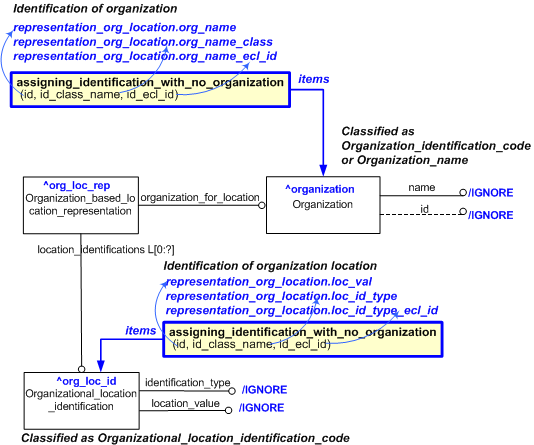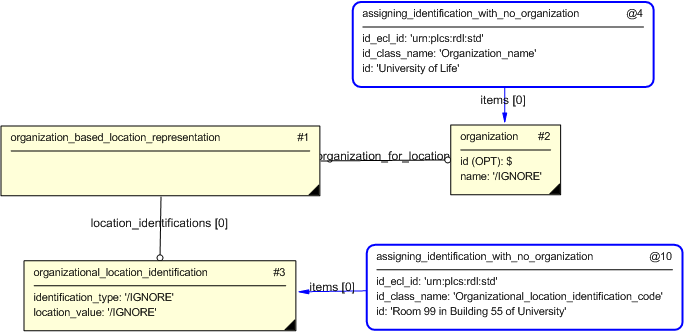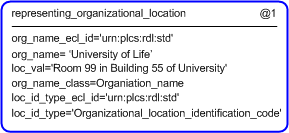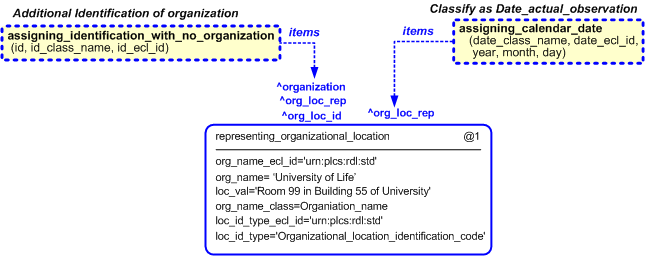
| Template:— representing_organizational_location (rep_org_locn) Capability:representing_location |
Date: 2005/08/15 08:20:35 : Revision: 1.11 |
This section specifies the template representing_organizational_location.
NOTE The template has been defined in the context of the capability representing_location which provides an overall description of the relevant parts of the ISO 10303-239 information model and a description of related templates.
NOTE An explanation of a template and the associated instantiation path is provided in the Template overview section.


target
is the parameter to which the
Organization
is bound.
-- The template assigning_organization_location has an external reference
-- organization. Bind this to the local external reference
-- Organization. It can now be the target for assignments
%^organization = $assigning_org_location.Organization%
-- assign '123456789' to the organization in the role of "DUNS_code"
/assigning_identification_with_no_organization(items=^organization,
id='123456789',
id_class_name='DUNS_code',
id_ecl_id='urn:plcs:rdl:std')/ target
is the parameter to which the
Organizational_location_identification
is bound.
-- The template assigning_organization_location has an external reference
-- org_loc_id. Bind this to the local external reference
-- Organizational_location_identification. It can now be the target for assignments
%^org_loc_id = $assigning_organization_location.Organizational_location_identification%
-- assign 'DRDL_QGJD' to the location in the role of "Location_identification_code"
/assigning_identification_with_no_organization(items=^org_loc_id,
id='DRDL_QGJD',
id_class_name='Location_identification_code',
id_ecl_id='urn:plcs:rdl:std')/ target
is the parameter to which the
Organization_based_location_representation
is bound.
| Entity in path | Value | Inherited from |
| Organization.name | '/IGNORE' | — |
| Organization.id | '/IGNORE' | — |
| Organizational_location_identification.identification_type | '/IGNORE' | — |
| Organizational_location_identification.location_value | '/IGNORE' | — |


NOTE this characterization is optional.
Where the representation is defined in the context of an alternative location representation, it is recommended that dates be associated with the main Location for which this is an alternative. However, where specifically required dates can be associated with the Organization_based_location_representation instantiated by the template as shown below.

Note this requires the use of the reference parameter
$representing_organizational_location.org_loc_rep to identify the
Organization_based_location_representation
instantiated by the template representing_organizational_location.
NOTE this characterization is optional.
An identifier can be associated with the instance of Organizational_based_location_representation by
using the template
assigning_identification_with_no_organization.
Where required an [Organizational_based_location_identification_code]![]() Error RDL1: The class Organizational_based_location_identification_code does not exist in RDL at URI urn:plcs:rdl:std. Check
the dexlib/data/refdata/rdl_index.xml
Error RDL1: The class Organizational_based_location_identification_code does not exist in RDL at URI urn:plcs:rdl:std. Check
the dexlib/data/refdata/rdl_index.xml
- (i.e. the location within the context of the relevant Organization) can be assigned to an instance of
Organization_based_location_representation. This should be done when more than one instance of
Organization_based_location_representation is referenced in the context of an alternative location.
The model allows for a list of [0:?] Organizational_location_identification instances to be created. The template forces one instance of Organizational_location_identification to be created and one instance of identification_assignment to carry the location and identification type. However, because the location identification instance is accessible outside of the template, any number of assignments can be made to the Organizational_location_identification, if required using the template assigning_identification_with_no_organization. This makes creating a separate instance of for each one superfluous. Thus, it is recommended to create only a single Organizational_location_identification for each representation. There may be 1 or many location and identification types assigned using assigning_identification_with_no_organization for each organization represented.
NOTE The identifier type should be of class "Organizational location identification code" (urn:plcs:rdl:std:Organizational location identification code).
Further identifiers can be associated with the instance of Organization by using the template assigning_identification_with_no_organization. This might include additional organization id codes that can be assigned to an instance of Organization, if required (e.g. CAGE Code, UID..). The assignment should be classified as a type of "Organization identification code" (urn:plcs:rdl:std:Organization identification code) or "Organization name" (urn:plcs:rdl:std:Organization name).
© OASIS 2010 — All rights reserved